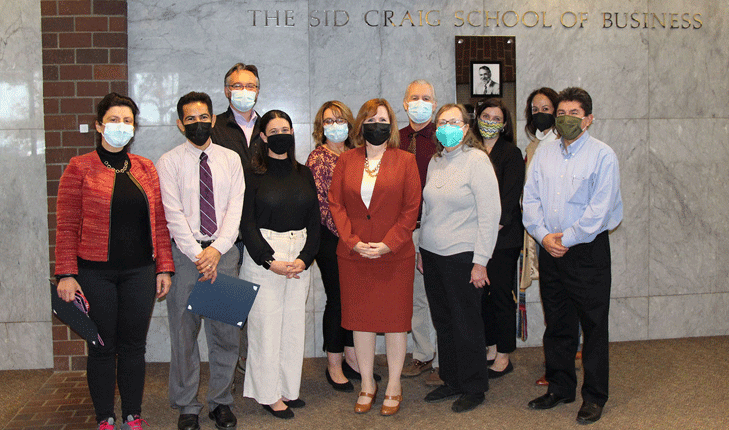Inclusive teaching isn’t just the right thing to do — it’s a must-have for academic success, said a pioneering group of Craig School of Business faculty who are the first Fresno State instructors to complete the Inclusive Teaching for Equitable Learning micro-credential, an evidence-based course designed to improve student success rates.
“This isn’t about us as teachers, this is about the students. The ultimate goal is to improve the quality of instruction, to make it more conducive to learning, to allow students to participate more, to express and collaborate more freely and to get better grades,” said Dr. Antonio Avalos, chair of the Economics Department, who was both a co-facilitator and a student of the course.
Practicing inclusion in everyday teaching is essential to fulfilling the University’s primary mission of education, Avalos said. “My experience is that if there isn’t equity in the classroom, students’ motivation can diminish. Students can feel isolated and that does not help in building a positive classroom atmosphere. The ultimate consequence, of course, is poor learning and bad grades.” Avalos said.
“This all goes back to the University mission statement, to educate and empower students for success,” said Dr. Jennifer Miele, interim chair of the Department of Finance and Business Law, who also co-facilitated the course.
“Fresno State students are predominantly nontraditional students. Many are first-generation university students. They’re incredibly diverse. They have jobs, families and outside responsibilities. We have to respect who our students are to meet their real needs and teach them effectively,” Miele said.
Twenty-nine Craig School faculty participated in the 10-week course during the fall 2021 semester. This pioneering group includes the first Fresno State instructors and the first business faculty in the California State University system to receive this training.
The online course, created by the Association of College and University Educators, consists of five modules on teaching practices for developing students’ sense of belonging; ensuring course materials are accessible; developing appreciation for diverse viewpoints; understanding how diversity aids in innovation; and setting expectations for productive dialogue.
To create an equitable learning environment within the course itself, the course facilitators are also participants taking the course for the first time. Faculty who complete the course earn a nationally recognized micro-credential.
Avalos praised the empiricism and rigor of the training. “All the materials in the course are evidence-based. Everything is based on research with citations of sources,” Avalos said.
Avalos emphasized that the goal of the course is to give instructors practical tools to effectively implement inclusive principles during instruction.
“The course showed us how to create a more inclusive syllabus, build a better safe space in the classroom and recognize when students feel like they don’t fit in. Our hope is that the faculty is going to implement principles of inclusion and equity in their curricula, syllabi, exams, texts and every aspect of their teaching,” Avalos said.
The effectiveness of the training will be tested in part through a pair of student surveys. At the start of the fall 2021 semester, before any faculty had taken the training, students were polled to establish a baseline of their experiences of diversity, equity and belongingness at the Craig School. Another survey will be taken in 2022, after faculty have implemented what they have learned, to see if students perceive an increase in inclusivity and belonging. In addition, another measure is being developed to assess faculty knowledge acquisition and application.
Thanks to a grant from the Fresno K-16 Collaborative, an additional 60 members of the Craig School faculty will have the opportunity to take part in new cohorts of training during the spring 2022 semester.






